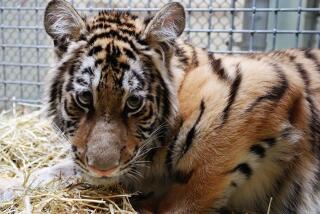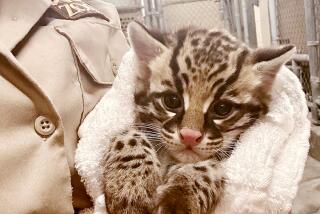All was not well with the National Zoo’s panda cub
The findings of an investigation into the death of the National Zoo’s giant panda cub are preliminary, but they show possible physical problems with the cub -- things that were “unusual” for an infant panda, officials said.
Amid mourning at the Smithsonian zoo after the sudden death of the panda, veterinarian Suzan Murray spoke to reporters Monday about preliminary findings of a necropsy performed on the cub, which lived less than a week.
The cub had liver irregularities and fluid in its abdomen, Murray said, adding that it was too early to determine whether the abnormalities had played a role in the cub’s death. Results of tests on tissue samples are expected within a week to help fully identify the cause of death, she said.
PHOTOS: Panda cubs and mothers; National Zoo mourns panda cub
Veterinarians at the zoo said they were able to determine that the cub was not crushed by its mother, Mei Xiang.
The cub, which was still unnamed in accordance with Chinese tradition, was conceived by artificial insemination and was Mei Xiang’s second cub in seven years.
During the news conference, zoo officials referred to the cub as “she” because they said it appeared to be female, but there will be no conclusive evidence of the gender until lab tests are completed.
A small amount of milk was found in the cub’s gastrointestinal tract -- evidence that it had nursed -- but because the tract was not full, the veterinarians said they could not confirm how well the cub had been nursing in the hours before its death.
QUIZ: How much do you know about pandas?
The fluid found in the abdomen is an “unusual finding” for a cub of such a small size, Murray said, although some free fluid in the abdomen would not be unusual in an adult giant panda.
The cub’s liver also appeared abnormal and “felt a little hard in places” -- and the color was “not uniform,” Murray said.
According to zoo director Dennis Kelly, Mei Xiang has been cradling a toy in a way similar to how she had been cradling her cub -- a clear sign, he said, that she has not stepped out of the mothering role.
Kelly said he was “cautiously optimistic,” based on reports from zookeepers, that the mother would slowly return to her normal routine, adding that she’d already begun eating bamboo and biscuits.
Zoo officials said they have been in contact with their Chinese counterparts about the death.
“Collectively, their concern, our concern is for Mei Xiang,” Kelly said. “Hopefully we will get a better understanding of giant panda reproduction and cub health,” as a result of the cub’s death, he said.
The zoo’s panda exhibit will remain temporarily closed while zookeepers monitor the mother’s health, officials said.
ALSO:
6 fugitives recaptured after escaping juvenile detention
Houston police shoot, kill pen-waving amputee in wheelchair
Airport error: Officer trying to unload gun accidentally fires it
nation@latimes.com
More to Read
Sign up for Essential California
The most important California stories and recommendations in your inbox every morning.
You may occasionally receive promotional content from the Los Angeles Times.










